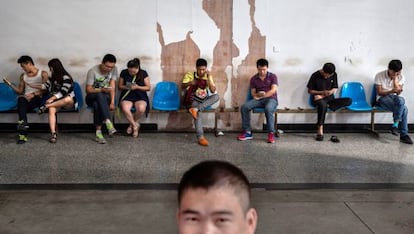China’s Millennials face a tough future
The economic slowdown is having a serious effect on the expectations of a generation


There is more than a trace of bitterness in Yang Rui’s smile. The 23-year-old has just spent the last couple of hours handing out his CV to prospective employers at a job fair in Beijing. But after four months visiting the human resources departments of hundreds of companies based in the Chinese capital, this recent graduate in Urban Planning from the Tianjin Construction University says he’s running out of hope. “There is nothing going on in my sector. By this time last year I would have found something, I’m sure. But this year there has been a sharp downturn, particularly in architecture and construction. I had high hopes, but right now I’d take just about anything.”
Things are changing fast, and the seven million young people who sign up for university courses each year will join a marketplace with eight percent unemployment
Yang’s experience will be familiar to the majority of recent graduates from Western universities, but this is a relatively new situation in China, one that is worsening as the economy, the world’s second-largest, slows down. Until a few years ago, a university degree was the key to entering the labor market. And for those who hadn’t attended higher education, there were plenty of opportunities in the manufacturing sector, located in the big cities of China’s coastline. But things are changing fast, and the seven million young people who sign up for university courses each year will join a marketplace with eight percent unemployment.
The collapse of the Chinese stock markets this August have added further doubts about the future of the generation born after 1990.
It’s a widely held belief in China that without guanxi (contacts), few doors will open. “In our current society it is very important to have connections,” says Zhang Song, aged 22, and who’s looking for work in the food quality-control sector. “If you don’t have the right connections, you have to try so much harder. But it should depend on the effort and ability of the individual, it’s not fair that your career depends on who you know.”
“After two decades of double-digit growth, the economy has begun to slow down, and things are very difficult, especially for the so-called Millennium generation, born in the decade leading up to the year 2000, who have been hit hardest,” says Eric Fish, author of China’s Millennials: The Want Generation. He is concerned about how this generation will react if they come to believe that the Communist Party is unable to keep its side of the social contract and unemployment continues to rise and the economy slows down.
Tomorrow’s university graduates still share Deng Xiaoping’s belief that making money is “glorious”, says Fish, adding: “But they have begun to look beyond money as a goal in itself, and increasingly see it as a means to an end. They want to make something of their lives, to give their lives greater meaning.”
Disenchanted with traditional politics
In large part, this is a generation that is disenchanted with politics. A survey by CASS, the Chinese Academy of Social Sciences, shows that graduates of the top universities are less and less keen to join the Communist Party. Official figures show that 34 million of the 85 million members of the Communist Party have attended some form of higher education: 25 percent of the party is still aged under 35. And while they may not wish to enter politics, they are still interested in good causes. Around a third of under-35-year-olds say they support not-for-profit groups. They prefer single-issue activism to do with social issues, which can be dangerous. Five young feminists who were planning a campaign against sexual discrimination were arrested and held for more than a month at the beginning of the year.
Five young feminists who were planning a campaign against sexual discrimination were arrested and held for more than a month at the beginning of the year
The Chinese government is following all this closely. Since Xi Jinping took office, the state has tightened its grip on the social networks. At the beginning of this year, universities were told to remove anything that reflected or referred to “western values,” such as democracy or an independent judiciary.
Furthermore, the authorities announced this week that post-graduate students would have to undergo a personal meeting. The “ideological and political qualities” of candidates, along with their “moral values” will largely decide if they are to be accepted.
Tu suscripción se está usando en otro dispositivo
¿Quieres añadir otro usuario a tu suscripción?
Si continúas leyendo en este dispositivo, no se podrá leer en el otro.
FlechaTu suscripción se está usando en otro dispositivo y solo puedes acceder a EL PAÍS desde un dispositivo a la vez.
Si quieres compartir tu cuenta, cambia tu suscripción a la modalidad Premium, así podrás añadir otro usuario. Cada uno accederá con su propia cuenta de email, lo que os permitirá personalizar vuestra experiencia en EL PAÍS.
¿Tienes una suscripción de empresa? Accede aquí para contratar más cuentas.
En el caso de no saber quién está usando tu cuenta, te recomendamos cambiar tu contraseña aquí.
Si decides continuar compartiendo tu cuenta, este mensaje se mostrará en tu dispositivo y en el de la otra persona que está usando tu cuenta de forma indefinida, afectando a tu experiencia de lectura. Puedes consultar aquí los términos y condiciones de la suscripción digital.








































